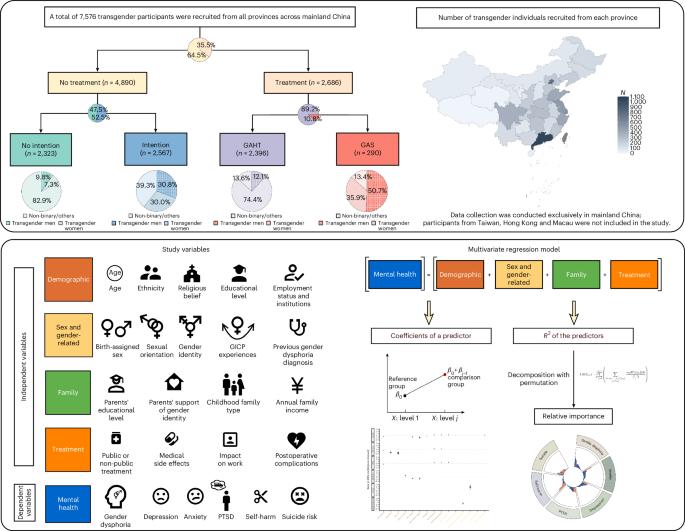Investigating the association between gender-affirming treatment intentions and choices on mental health among transgender individuals
IF 8.7
引用次数: 0
Abstract
Gender-affirming treatments, including gender-affirming hormone therapy and gender-affirmation surgery, aim to align transgender individuals’ physical appearance with their intrinsic gender identity. However, one-third of 7,576 participants (mean age: 21.61) in the Chinese Transgender Health Survey reported no intention of pursuing these treatments. This study examines the associations between sociodemographic, treatment-related factors and mental health across four groups: no intention for treatment (n = 2,523), intending treatment not started (n = 2,576), gender-affirming hormone therapy (n = 2,369) and gender-affirmation surgery (n = 290). Notably, the surgery group reported the highest gender dysphoria, while the hormone group exhibited the highest levels of anxiety, depression, post-traumatic stress disorder, self-harm and suicide risk. Multivariate regression models revealed that sociodemographic factors, such as education, were differently associated with mental health statuses across groups, showing a complex mosaic effect. Here we show that these differences do not imply treatment effects but rather highlight the need for personalized clinical considerations in gender-affirming care. This study analyzes associations between sociodemographic factors, treatment intentions and mental health among transgender individuals. Utilizing multivariate regression, findings reveal distinct mental health challenges across treatment groups, emphasizing the necessity for personalized approaches in gender-affirming care.

调查性别确认治疗意向与跨性别者心理健康选择之间的关系
性别确认治疗,包括性别确认激素治疗和性别确认手术,旨在使跨性别者的外表与其内在的性别认同保持一致。然而,在中国跨性别健康调查的7576名参与者(平均年龄:21.61岁)中,有三分之一的人表示无意进行这些治疗。本研究考察了四组患者的社会人口学、治疗相关因素与心理健康之间的关系:无意治疗(n = 2523)、未打算开始治疗(n = 2576)、性别确认激素治疗(n = 2369)和性别确认手术(n = 290)。值得注意的是,手术组报告了最高的性别焦虑,而激素组表现出最高的焦虑、抑郁、创伤后应激障碍、自残和自杀风险。多元回归模型显示,社会人口因素(如教育)与不同群体的心理健康状况存在不同的相关性,显示出复杂的马赛克效应。在这里,我们表明这些差异并不意味着治疗效果,而是强调在性别确认护理中需要个性化的临床考虑。本研究分析社会人口学因素、治疗意向与跨性别者心理健康的关系。利用多元回归,研究结果揭示了不同治疗组的不同心理健康挑战,强调了在性别确认护理中采用个性化方法的必要性。
本文章由计算机程序翻译,如有差异,请以英文原文为准。
求助全文
约1分钟内获得全文
求助全文

 求助内容:
求助内容: 应助结果提醒方式:
应助结果提醒方式:


